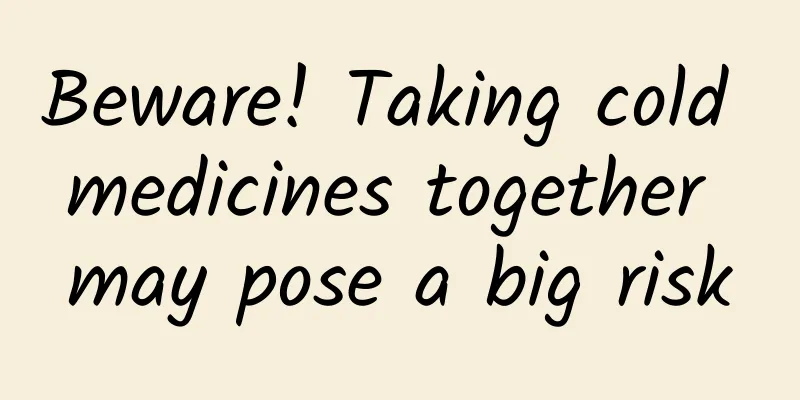Beware! Taking cold medicines together may pose a big risk

|
Recently, respiratory diseases have become prevalent, and many patients have used cold medicines to relieve symptoms. Some patients even take cold medicines in order to speed up their recovery. According to reports, Mr. Chen, a man in his 50s from Xiamen, turned into a "yellow man" and suffered liver and kidney failure because he took multiple cold medicines for three days. His life was in danger. After five plasma exchanges, Mr. Chen was finally out of danger. There are also cases around us where taking cold medicines in combination has led to dangerous consequences. Ms. Zhang, 56, took four cold medicines at once and developed symptoms of general fatigue, dizziness, vomiting, shortness of breath and chest tightness. Fortunately, she stopped taking the medicines in combination immediately and her symptoms were relieved. So, why can't cold medicines be taken together? What are the hazards of taking cold medicines together? What is the safe way to use medicines? Recently, the reporter interviewed Peng Zhenghong, director of the pharmacy department. Ingredients and functions of common cold medicines Peng Zhenghong said that taking cold medicines in combination may pose huge risks. To understand the risks of taking cold medicines in combination, we must first understand the ingredients and functions of common cold medicines. Antipyretic analgesics: acetaminophen and nonsteroidal anti-inflammatory drugs. They can relieve headache, fever and body aches and can be taken for a short period of time. Antihistamines: chlorpheniramine maleate, diphenhydramine hydrochloride, promethazine, etc. Can relieve symptoms of coughing, sneezing and runny nose. Decongestants: mainly sympathomimetic drugs, available in oral and topical nasal dosage forms, including pseudoephedrine, phenylephrine, oxymetazoline, etc. They can reduce nasal congestion by acting on α-adrenergic receptors to constrict nasal mucosal blood vessels. Antitussive drugs: dextromethorphan hydrobromide, codeine, cloperastine, dioxetine, etc. They can relieve cough symptoms caused by colds. Expectorants: guaifenesin, carbocysteine, etc. People with common colds may have a small amount of sputum in the later stages, and nasal secretion backflow can also bring a feeling similar to sputum. Expectorants can relieve cough symptoms during colds and are often used in combination with antitussive drugs. Other ingredients: artificial bezoar, which is an antipyretic and sedative, synergistic with antipyretic and analgesic drugs; caffeine, synergistic with antipyretic and analgesic drugs, reducing the drowsiness side effect of antihistamines; amantadine, used for influenza, has an antipyretic effect; zinc gluconate, inhibits viral replication and improves the body's antiviral ability, etc. There are risks in taking cold medicines together "By understanding the ingredients and functions of common cold medicines, we can see that many cold medicines have overlapping ingredients and the drugs may interact with each other, causing excessive burden on the human liver. This is why taking cold medicines in combination can be a huge risk," said Peng Zhenghong. Specifically, multiple cold medicines may contain the same active ingredients. If the ingredients are taken repeatedly, not only will the efficacy be repeated, but excessive dosage may also cause liver damage or even irreversible damage (such as acetaminophen). In addition, if you take multiple cold medicines at the same time, different medicines may interact with each other, which may affect the efficacy at the very least, or cause toxic side effects at the worst. Finally, the human liver is the main site of drug metabolism. Taking multiple cold medicines at the same time may cause liver overload and damage liver function. Safe medication use To ensure the safety of medication, Peng Zhenghong reminds that when taking cold medicine daily, you should keep in mind the following requirements: Do not take antipyretics at will. Generally, antipyretics such as acetaminophen and ibuprofen can only be taken when the body temperature is above 38.5℃. Taking antipyretics is a symptomatic treatment for fever and reduces the risks associated with high temperature. You can stop taking the medicine after the body temperature drops, and there is no need to take it continuously. Cold preparations containing pseudoephedrine and methylephedrine, elderly patients who are sensitive to ephedrine, patients with breathing difficulties such as heart disease, hypertension, hyperthyroidism, glaucoma, emphysema, patients with prostate hypertrophy and dysuria, and patients with depression should not take it. Children should use compound anti-cold medicines specially formulated for children to avoid liver and kidney damage due to their weak liver and kidney functions and easy accumulation of drugs. Pregnant women must take cold medicine under the guidance of a doctor throughout the entire process to avoid affecting the normal development of the fetus due to improper use of medication. The medication should be selected according to the clinical symptoms of the cold. For example, if the patient only has a stuffy nose and runny nose, in principle, compound cold medicines containing antipyretic, analgesic and anti-inflammatory drugs should not be used. After taking any cold medicine, pay close attention to whether there are abnormal reactions, such as persistent nausea, vomiting, or yellowing of the skin and eyes. In addition, diabetic patients should choose sugar-free preparations when choosing cold medicines; they should avoid drinking alcohol when taking antipyretics and analgesics; antihistamines can cause drowsiness, and people engaged in dangerous work should avoid taking them; more than 90% of colds are caused by viruses, and antibiotics should not be used unless necessary. "We recommend that patients with a cold seek medical attention and take medication correctly under the professional guidance of a doctor. If you take cold medicine on your own, you should choose it wisely, read the instructions carefully before use, understand the drug ingredients, and avoid repeated use that may lead to adverse drug reactions." said Peng Zhenghong. |
>>: Why are types 16 and 18 high-risk HPV viruses? -- Popular knowledge about cervical cancer
Recommend
It’s no exaggeration, people can really be “angered to death”!
Review expert: Wu Xinsheng, deputy chief physicia...
What are the symptoms of moderate cervical erosion?
Have you ever heard of cervical erosion? In fact,...
Why does a woman's lower abdomen hurt when pressed?
In our daily lives, we always have headaches and ...
How to lose weight during menstruation?
There is a saying on the Internet that women will...
Early symptoms of vaginal cancer
Vaginal cancer is a malignant disease of the fema...
What to do if a woman has a sunken forehead
From the perspective of physiognomy, the forehead...
What are the causes of abnormal vaginal bleeding?
Nowadays, more and more working women are often t...
What to use for gynecological itching
There are many things that humans can't help ...
What should women eat to improve immunity?
We all know that the body's immune ability is...
Treatment of small submucous uterine fibroids
Submucosal uterine fibroids are uterine fibroids ...
Why do I always sprain my ankle when walking? How can I recover from frequent sprains?
Many people have experienced their ankle slipping...
Abnormal menstrual color, beware of gynecological inflammation
We must always pay attention to changes in our bo...
Picture of female cockscomb warts
Genital warts in women are epithelial cell prolif...
What is vaginal burning?
Gynecological diseases are the most headache-indu...
What to do if you have vaginal pain after childbirth
After a woman gives birth naturally, the doctor w...









